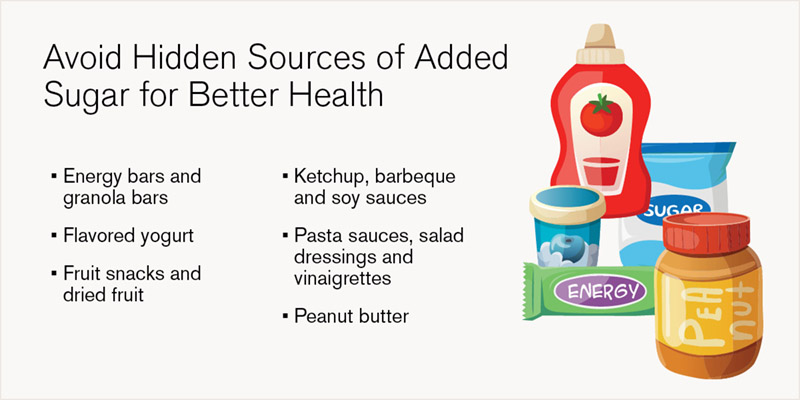
If you’re trying to find the “sweet spot” for your health, you’ll probably need to cut down on sugar.
The average American consumes about 1.5 times more sugar each day than they should.
It’s not surprising, considering sugar is an added ingredient in many foods — even those you think are healthy.
“Changing your diet can be difficult,” says internal medicine and pediatrics specialist Audrey Hiltunen, MD. “You don’t need to give up sugar entirely. It’s more about working toward a healthier lifestyle that provides balance.”
How much sugar per day should you have?
Sugar isn’t an essential nutrient, so there’s no recommended daily allowance. But experts have set a limit on how much sugar is too much. According to the Dietary Guidelines for Americans, you should limit your calories from added sugar to less than 10% per day.
You may be wondering what “added sugars” are. Many foods contain natural sugar, including fruits, vegetables, grains and dairy products. Added sugars are sweeteners manufacturers put into foods during processing to boost flavor. On food labels, you’ll see these ingredients listed as sugar, corn syrup, honey, sucrose and fructose, to name a few.
Using an average daily intake of 2,000 calories, you should limit yourself to less than 200 calories from added sugar. That amount translates to 50 grams of sugar, or about 12 teaspoons.
But not everyone has a recommended daily intake of 2,000 calories. The amount you need varies by age, gender, activity level, weight loss goals and pregnancy status.
The average daily calorie needs range from 1,600 to 2,400 for women and 2,000 to 3,000 for men. Daily calorie needs for children vary widely from 1,000 for a 2-year-old to 3,200 for an active 16-year-old boy.
What are the biggest sources of added sugar?
Nearly half of the added sugar in most people’s diets comes from sugary drinks. “A 16 ounce bottle of one popular soft drink has 51 grams of sugar, more than you should have in one day,” says Dr. Hiltunen.
“Sports drinks, energy drinks, fruit juices, sweet tea and sugary coffee drinks are also packed with sugar. Many people aren’t fully aware of how much sugar they drink in a day.”
Other common sources of added sugar include candy, cereal, baked goods and desserts. Also look out for hidden sugar in many common foods, snacks, sauces and condiments.

Why is added sugar bad for you?
Too much sugar in your diet can cause a wide range of problems. Some of the negative health effects of added sugar include:
- Cavities: Bacteria in your mouth eat sugar and produce acid as a byproduct. The acid eats away at tooth enamel and creates holes, or cavities.
- Diabetes: When you eat refined sugar, your blood sugar spikes and your body has to work overtime to bring your blood sugar back down. Over time, your ability to manage these spikes decreases and you can develop Type 2 diabetes.
- Heart disease: Excess sugar in your blood can damage cells and tissues, especially blood vessels. This damage leads to plaque buildup inside the blood vessels and increases your risk of heart attack and stroke.
- Weight gain: Your body stores excess sugar as fat, which can lead to weight gain. Also, when too many calories come from sugar, you’re not getting the nutrients you need. So, you’ll still be hungry and more likely to overeat.
Research is finding that sugar may also be linked to other health conditions, such as:
- Depression
- Inflammation
- Joint pain
- Liver disease
- Mood changes
- Skin aging
How to reduce sugar intake
The first step in reducing sugar in your diet is recognizing where the sugar is coming from. “I always ask patients how much soda and other sugary beverages they drink,” says Dr. Hiltunen.
“It’s an important discussion, even for people who are relatively healthy, because too much sugar could cause problems down the line.”
If you’re concerned about how much sugar you consume, here are some tips for cutting back:
Read food labels
Food labels can help you track what you eat. They typically provide a breakdown of:
- Total sugars in grams
- Added sugars in grams
- Percent of daily value for added sugars based on a 2,000-calorie-per-day diet
“I really encourage people to look at food labels,” says Dr. Hiltunen. “You may be surprised to find out how much added sugar is there. Foods you may think are healthy are loaded with sugar.”
Start with small dietary changes
Eliminating sugar from your diet entirely is not sustainable and can leave you feeling deprived and frustrated. Denying yourself all sugar can also lead to bingeing.
Small changes are easier to maintain and can lead to a healthier lifestyle. “I work with patients to make incremental changes,” says Dr. Hiltunen. “If you’re drinking a couple of sodas every day, try reducing that to one soda a day. Then work on getting it down to three times a week, then once a week.”
It’s okay to keep some sugar in your diet, but moderation is key. You shouldn’t eat those foods every day. Think of them as a special treat.
Choose healthier food options
Foods with natural sugars can help satisfy a sweet tooth without the negative effects of added sugars. They also have fiber, which slows digestion and prevents spikes in your blood sugar. Try fruits such as berries, apples and grapes.
“Fruit juices may seem like a good option, but they’re not,” says Dr. Hiltunen. “They don’t have fiber like whole fruit does and may have added sugar.”
And if you’re craving soda, flavored water and seltzer are good options. Diet soda may not be the best choice, but it’s better than a sugary drink, says Dr. Hiltunen.
Stay away from fad diets
Fad diets often cut out sugars and carbs. While that might seem like a good idea, they typically don’t lead to long-term weight loss.
“The hard part about diets is they focus on restrictions,” says Dr. Hiltunen. “When you think about reducing sugar as creating a healthier lifestyle, you shift the narrative from imposing limits to creating possibilities.”
For Dr. Hiltunen, a quote from journalist Michael Pollan reflects the ideal meal plan: “Eat food, not too much, mostly plants.” The best approach is a diet rich in:
- Fruits and vegetables
- Lean proteins
- Low-fat dairy
- Whole grains
Limit foods that contain added sugar, saturated fat and salt. A good place to start to realign your diet is myPlate.gov.
See a dietitian
Dietitians are important resources for anyone who wants to improve their diet. They also work with parents so they can help their children.
“As a primary care provider, dietitians are some of our best allies,” says Dr. Hiltunen. “They do a complete assessment of your diet, help you find ways to make healthier choices, and provide support and reassurance.”
Start building healthy eating habits at a young age
Children under age 2 shouldn’t have any added sugar. “When it’s time to start solid foods, I recommend introducing vegetables first,” says Dr. Hiltunen. “Infants learn tastes and textures early. If you introduce sweet foods first, they may not want vegetables later.”
Dr. Hiltunen also steers parents away from giving young children fruit juice. She recommends:
- After 12 months, give 2% milk (but no more than 24 ounces a day) or water
- Give juice only as a special treat and dilute it with water
- Never give juice in a bottle at night — this can cause cavities
Internal medicine and pediatrics at Loyola Medicine
Loyola Medicine offers comprehensive primary care through its internal medicine and pediatrics program. Our dual-trained specialists care for patients of all ages. They offer a unique approach to routine checkups, preventive care and management of complex chronic diseases.
Our internal medicine and pediatrics offices located throughout Chicago’s western and southwestern suburbs are accepting new patients. To make an appointment, call 888-584-7888 or schedule an appointment online.
Audrey Hiltunen, MD, is an internal medicine and pediatrics specialist at Loyola Medicine and is board certified in both specialties. Dr. Hiltunen earned her medical degree at the Medical College of Wisconsin.
In her practice, Dr. Hiltunen’s areas of interest center around patient-provider communications and how social factors influence people’s health. She believes in developing trusted relationships with her patients and collaborating with them to make important health care decisions.
Book an appointment today to see a Loyola Medicine primary care provider by self-scheduling an in-person or virtual appointment using myLoyola.

